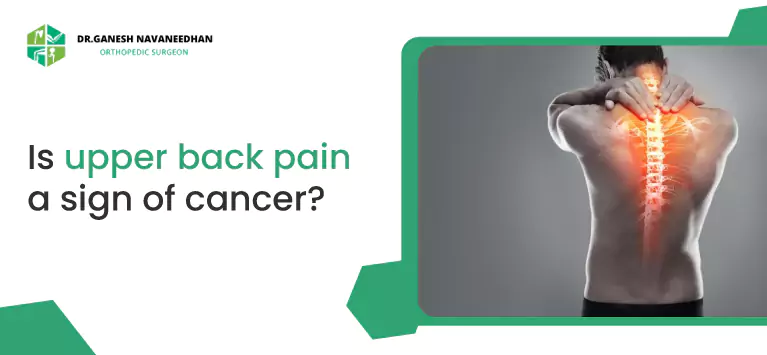- +91 62384 78716 +91 99475 78797
-
Sasthamangalam, Trivandrum
Sasthamangalam, Trivandrum

Back pain is a common ailment that most people will experience at some point. Several factors, including muscle strain, poor posture, and underlying health conditions, can cause it. However, for some people, back pain can be a symptom of a more severe health issue, such as cancer.
In this blog, we’ll explore whether upper back pain is a sign of cancer and what you should do if you’re experiencing this symptom.
Back pain can be a common symptom of certain types of cancer, such as bone, breast, lung cancer, etc. cancer-related back pain may occur due to the following reasons:
Tumor growth: Cancerous tumors can pressure the nerves, bones, or other tissues in the back, leading to pain.
Metastasis: Cancer can spread to the spine or other body parts, causing back pain.
Treatment side effects: Some cancer treatments, such as chemotherapy or radiation therapy, can cause back pain as a side effect.

It’s important to understand that is backache a sign of cancer, is not always the case. Most cases of back pain are not related to cancer at all. However, certain types of cancer can cause back pain as a symptom. These include lung cancer, breast cancer, and pancreatic cancer, among others.
While it’s unusual for upper back pain to be a symptom of cancer, it’s possible in some instances:
Primary Lung Cancer: Upper back pain can be an early sign of primary lung cancer, especially if it’s accompanied by other symptoms such as coughing, shortness of breath, or chest pain.
Metastatic Cancer: If cancer has spread from another part of the body to the bones, lungs, or other structures in the upper back, it can cause pain.
Some common symptoms of upper back pain that may be associated with cancer include:
Back pain can be a warning sign for several types of cancer, such as:
Back pain may occur when prostate cancer spreads to the bones. This can be an early indication of the disease, especially if accompanied by other symptoms like urinary issues.
Yes, upper back pain can sometimes be a sign of breast cancer, especially if the cancer has spread to the spine. While back pain alone is not a definitive symptom of breast cancer, it could be an early indication if accompanied by other signs like changes in breast tissue, swelling, or discomfort in the breast area. It’s important to consult with a healthcare professional if you experience persistent or unusual pain.
Yes, upper back pain can sometimes be associated with lung cancer, although it is often caused by other conditions. When back pain is related to lung cancer, it is usually due to a tumor pressing on the spine or nearby nerves. This type of pain tends to be persistent and may worsen over time, especially when lying down or taking deep breaths. It may also be unrelieved by rest and unrelated to movement.
Other common symptoms of lung cancer include:
If back pain is accompanied by these symptoms, it’s important to seek medical attention to determine the cause. In some cases, the pain may radiate to other areas like the arms, buttocks, or legs, and you may feel numbness, weakness, or stiffness in the back or neck. Upper back pain and lung cancer are connected, so be aware and take proper care by consulting the orthopedic doctor.
Upper back pain from cancer can feel like a dull ache or sharp stabbing sensation in the area between your shoulder blades. It may also radiate to the sides of your back or up into your neck. The pain can be constant or come and go, depending on the type and stage of cancer.
Some people describe the pain as a tightness or pressure in their upper back that worsens with movement or specific activities. It may also accompany other symptoms such as weakness, tingling, or numbness in the arms or legs.
In some cases, upper back pain from cancer can be more severe and debilitating, making it difficult to do daily tasks or even sleep comfortably. This type of pain may be a sign that the cancer has spread to the bones or nerves in the upper back.
In addition to back pain, several other symptoms may indicate a connection between back pain and cancer. These symptoms include:
It’s essential to seek medical attention promptly if you experience any of the following symptoms along with upper back pain:
Is backache a sign of cancer?
Yes, back pain can be a sign of cancer, though it is rare and often linked to other conditions. Some cancers that may cause back pain include:
Cancer-related back pain is usually a constant, dull ache that doesn’t improve with movement. Other symptoms, like fatigue, nausea, and confusion, may also occur. If the pain persists, it’s important to seek medical advice.
Copyright © 2025 Dr. Ganesh Navaneedhan. All Rights Reserved. | Designed By Harvee healthcare